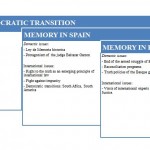By Antton Maya
As the Srebrenica commemorations highlighted few weeks ago, it is obviously hard to deal with the past after a period of violence. Indeed, violent episodes generate storytelling clashes through the memory-making process, focusing on the need to build a pacific common space to share different sufferings and ensure a positive peace[1].
In the Basque Autonomous Community, the development of a memory-making process could be linked with a form of “post-transitional justice”[2]. This notion derives from the concept of transitional justice, which designs “the set of judicial and non-judicial measures that have been implemented by different countries in order to redress the legacies of massive human rights abuses”[3]. It is based on four pillars: the right to the truth, the right to justice, reparations and guarantees of non-recurrence. Thus the post-transitional justice deals with the implementation of these four pillars after a period of strong violence. For example, the trial in 2011 dealing with the ESMA in Argentina[4] could be analyzed as a form of post-transitional justice, as they occurred thirty years after the end of the military junta.
Apart from legal proceedings, the example of Spain and Basque Autonomous Community shows off an original and interesting memory-making process in the heart of Europe.
WHAT PAST TO DEAL WITH IN SPAIN AND IN THE BASQUE AUTONOMOUS COUNTRY?
Talking about political violence in the Basque Autonomous Country refers to a long period, from the Spanish civil war, which made Spain rank second worldwide in terms of missing persons. The bombing of the town of Gernika appears as a dramatic illustration of this strong political violence. This period gave way to the repressive Franco regime until the death of the Caudillo, not only in the Basque Autonomous Country, but also in in Spain as a whole. However, despite the seriousness of the crimes committed, it seems hard to deal with the past in Spain and in the Basque Autonomous Country.
The Spanish democratic transition has been held up as a model, according to the “Third Wave” developed by Samuel Huntington[5]. Characterized by the amnesty laws of 1977, this period also gave birth to the Pacto de olvido, a sort of social consensus based on the reign of silence to ensure social reconciliation and political stability for the new Spanish regime. More than a political pact, this social informal agreement helped building a “mutual absolution”[6] between former enemy brothers, but made it almost impossible to deal with the violence of the past. This transition formed a sort of new Social contract focused on consensus, respecting the Weberian ethics of responsibility. If in a short-term period this socio political combination helped to ensure the stability of new democratic institutions, it seems to provoke memory outbursts on the long run.
THE MEMORY REAWAKENING IN SPAIN
In Spain, from 2000, associations of civil society started to ask for mass graves investigations, in order to identify missing persons of the Civil war. This movement has been illustrated by the emblematic example of the grandchildren of Federico Garcia Lorca. Fueled by Latin American associations such as Madres de la plaza de Mayo, this initiative became the first media-covered outburst in favor of a memory recovering in Spain. Another example of the memory trouble reminds in the action of the judge Baltasar Garzon[7]. Indeed, as he declared himself competent 2008 to investigate Franco’s crimes, he faced a strong opposition. Thus, he could not lead its investigations, whereas in the name of universal jurisdiction, he was fueling a fight against impunity in foreign countries, particularly in Latin America.
The Spanish government of José Luis Zapatero (Partido Socialista Obrero Español) decided to implement a new law in 2007, called Ley de memoria histórica[8], which goal was to work toward the “moral and legal rehabilitation” of the victims. This law represented a strong rupture because it aimed at providing assistance with the exhumations of the graves of the Civil War and the dictatorship. However, the new legislation has been criticized for being limited and providing few reparations. Moreover, the Partido Popular came back to the power in 2011 and seems to have undermined the application of this law.
However, at the international level, the use of the universal competence leads to the opening of trials against crimes that occurred during civil war and Franco regime, for example in Argentina[9], with the judge Marina Servini. On the other hand, in Spain, the recent irruption of Podemos in the last elections could fuel this memory reawakening process. Indeed, Manuela Carmena, the new mayor of Madrid, decided to apply the 15th article of the Ley de Memoria Historica[10], asking for the withdrawal of the street names linked with Franco regime.
A PROGRESSIVE MEMORY-MAKING PROCESS IN THE BASQUE AUTONOMOUS COUNTRY
In the Basque Country, this movement seems to be even stronger because of different features. On the one hand, the end of the violent actions of ETA in October 2011 represents an important rupture in the Basque society. This change seemed to help people to talk not only about violations of human rights during the last thirty years, but also about the Civil War and Franco regime. Indeed, ETA continued its violent actions after the Spanish democratic transition, which is why dealing with its end makes us think about its birth, directly linked with Franco regime. On the other hand, the right to the truth as an emerging international law standard receives a particular echo in this territory, through the visits of expert consultant on matters of transitional justice and human rights. Finally, the high degree of autonomy of the Basque Autonomous Community helps in understanding the singular memory process in this territory.
This strong memory-making process could be illustrated by two examples of initiatives of the Basque authorities. On the one hand, the Basque Parliament endorsed the decree 107/2012[11], which aims at awarding restitution to victims of political violence between 1960 and 1978. On the other hand, as part of the Peace and Coexistence Plan the Basque government announced in June 2015 the creation of the Institute of the Memory as the application of the Law 4/2014[12]. Called “Gogora” (“Remind”), this Institute will deal with the memory of “the civil war, Franco regime, terrorism of ETA and illegal counterterrorism”. Obviously, this process is provoking legal contradictions, and will probably generate judiciary opposition between Spanish and Basque authorities.
It is also necessary to highlight that this process is also fueled by lots of associations in the Basque Autonomous Community.
TOWARD A SPECIFIC POST-TRANSITIONAL JUSTICE PROCESS IN THE BASQUE COUNTRY?
If legal actions could be hard to define and to set up according to the civil war and franquism, the right to the truth and reparation, by implementing memory policies, seems to be progressively respected by Basque authorities. This whole process could give birth to a pacific dissent, sharing memories in a non-violent political and social scene.
Moreover, this process appears even stronger as the Autonomous Community of Navarre seems to ask for change according to its memory recovering process. Indeed, in March 2015, the Parliament of Navarre implemented a new law dealing with the memory of the political violence[13]. The political change spawned by the elections of May 2015 and the composition of the new Parliament of Navarre shows this change.
However, it is obvious that this memory process takes place in a entanglement of storytelling processes, as it refers to different territories and periods (see the figure below), and makes a post-transitional justice process event more complex to implement.
[1] Johan GALTUNG, Peace by Peaceful Means: Peace and Conflict, Development and Civilization, PRIO, 1996.
[2] Cath COLLINS, Post-Transitional Justice: Human Rights Trials in Chile and El Salvador, Pennsylvania State University Press, 2010.
[3] https://www.ictj.org/about/transitional-justice
[4] In November 2012 the trial of the Escuela de Mecanica de la Armada (ESMA) was set up. This institution was a torture center under the military junta. This center became a national museum for the memory and the headquarter of the Centro Internacionalpara la promocion de los derechos humanos, under the auspices of the United Nations Educational, Scientific and Cultural Organization.
[5] Samuel P. HUNTINGTON, The clash of civilizations and the Remaking of World Order, Simon & Schuster, 1996.
[6] Sophie BABY, « Sortir de la guerre civile à retardement : le cas espagnol », Histoire@Politique, n°3, novembre 2003.
[7] Guy HERMET, “L’apurement du passé”, Pouvoirs, revue française d’études constitutionnelles et politiques, n°98, 98 – L’Amérique latine, pp. 89-101.
[8] Ley de extensión de derechos a os afectados por la Guerra civil y a dictadura. http://www.defensa.bob.es/memoriahistorica/pdf/Ley_52_de_26_dic.pdf
[9] Case 4591/10 on charges of genocide and/or crimes against humanity committed in Spain by the Franco dictatorship between July 17, 1936 and June 15, 1977. “Spain: Seeking Justice in Argentina”, Dr Vincent DRULIOLLE, Santander Visiting Fellow, European Studies Centre, University of Oxford, http://www.justiceinfo.net/en/component/k2/430.html?Itemid=102
[10] The article asks for the removal of the Franco regime symbols from public buildings and spaces.
[11] Decreto 107/2012, de 12 de junio, de declaración y reparación de las víctimas de sufrimientos injustos como consecuencia de la vulneración de sus derechos humanos, producida entre los años 1960 y 1978 en el contexto de la violencia de motivación política vivida en la Comunidad Autónoma del País Vasco. Boletín Oficial del País Vasco, N°119, martes 19 de junio de 2012.
[12] Ley 4/2014, de 27 de noviembre, de creación del Instituto de la Memoria, la Convivencia y los Derechos Humanos. Publicado en BOPV núm. 230 de 02 de Diciembre de 2014 y BOE núm. 306 de 19 de Diciembre de 2014, Vigencia desde 22 de Diciembre de 2014.
[13] Ley Foral 16/2015, de 10 de abril, de reconocimiento y reparación de las víctimas por actos de motivación política provocados por grupos de extrema derecha o funcionarios públicos (BON de 15 de abril de 2015).

